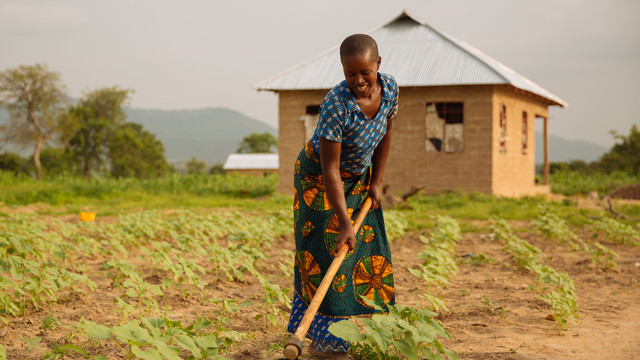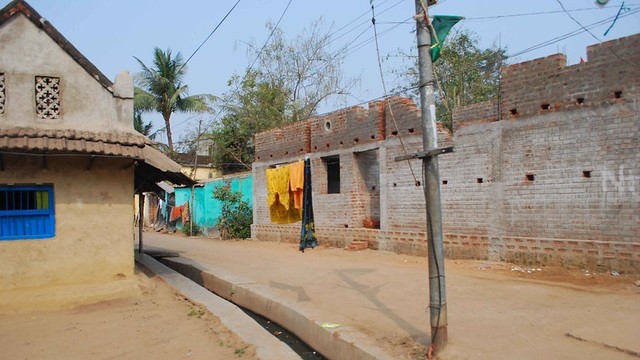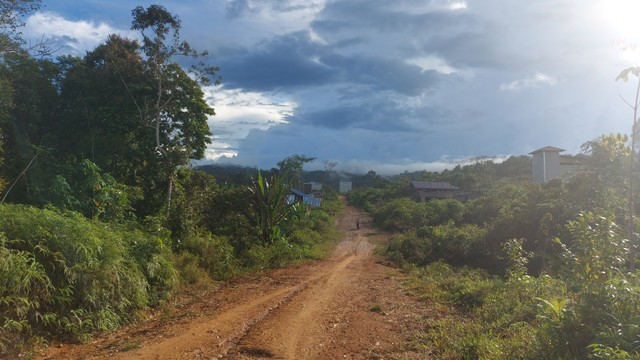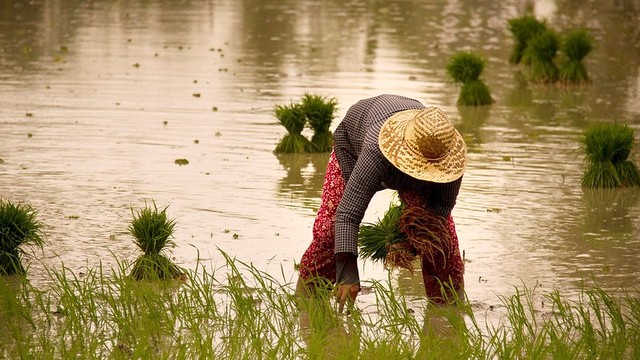Tackling the trade law dimension of ‘land grabbing’
As trade talks regain momentum, 'land grab' activists are scrutinising negotiations and pioneering new opportunities for public accountability.

Despite much talk about the imperative to ‘feed the planet’, opportunities for returns in lucrative export markets have been an important driver of large land deals for plantation agriculture in Africa and Asia.
Many land deals target food demand from rising urban middle classes in host countries. But much land acquisition involves plans to grow crops for export. This includes cereals like grains and rice, commodities like cotton and rubber, and ‘flex crops’ like oil palm, soy and sugarcane — which can be used for food, feed, fuel or industrial purposes.
This situation creates opportunities for public accountability. ‘Land grab’ campaigners looking for effective pressure points are increasingly targeting transnational corporations that buy agricultural commodities to produce food and consumer goods for global markets.
These companies may not acquire land themselves, but they may source huge volumes of farm produce from ‘land grabbers’ worldwide. Importantly, the companies may have global brands that are vulnerable to reputational risk, and they can exert significant leverage over their supply chains.
Earlier this month Oxfam persuaded Coca Cola, a major buyer of sugar, to commit to zero tolerance for ‘land grabbing’, and to require that its suppliers adhere to the principle of free, prior and informed consent. The commitment follows an Oxfam report that raised concerns about the role of sugar in fostering the land rush.
Trade law as an enabler of the land rush
Given the importance of international trade in shaping the land rush, it is somewhat surprising that the law regulating trade has received so little attention in ‘land grabbing’ debates.
Yet trade law affects important aspects of the global land rush. One reason is that trade liberalisation can increase pressures on land. As economies become more integrated and agriculture more commercialised, local land relations tend to become more commercialised too – because new market opportunities tend to increase land values. Much evidence shows that agricultural commercialisation can make local land relations more monetised and individualised.
The connection between the trade regime and large land deals can be more direct too. Trade liberalisation and improved access to export markets can increase incentives for large-scale agricultural investments that target those markets.
But large land deals have also been associated with trade restrictions. Export bans introduced by some big food exporters in the wake of the food price hike of 2007-08 increased concern among food-importing countries.
I experienced this first hand during a visit to Abu Dhabi late last year, as I reported in this book. Concerns about food security led some governments to promote land acquisitions overseas and take more direct control of their supply chains.
Also, some land acquirers targeting domestic markets have sought protection from imports – as documented in this report from Mali.
Regional and bilateral trade treaties increasingly include an ‘investment chapter’ that requires governments not to discriminate against foreign investors in the making of an investment. In principle, this would require governments to not take land governance measures that discriminate against foreign investors, unless countries have negotiated exceptions.
Under many treaties, foreign investors can challenge violations through international arbitration. Arbitrators tend to treat land as a commercial asset, as I discuss at greater length in a forthcoming journal article (now online here). In contrast, agrarian families may have lived on the same land for generations, and the disputed land may hold an important social and cultural role in their societies.
All these developments may gradually change the social, cultural and even spiritual connotations that the land has in many societies.
Busy days for trade negotiators
These issues are likely to be of growing relevance. With multilateral negotiations at the World Trade Organization (WTO) have slowed, major economies have been negotiating bilateral and regional trade deals that can have far-reaching repercussions for the lives of many.
Twelve countries around the Pacific Rim – Chile, Peru, Mexico, the United States, Canada, Japan, Vietnam, Malaysia, Singapore, Brunei, Australia and New Zealand – are in the final rounds of negotiations for a Trans-Pacific Partnership. The deal is set to liberalise trade, promote investment flows and strengthen protection of intellectual property rights across an area covering about 40 per cent of world trade.
The European Union has negotiated a Comprehensive Economic and Trade Agreement with Canada, and started negotiations for ambitious trade and investment deals with the United States and China. Numerous other deals are under negotiation, linking distant corners of the world.
The deals can have implications for countries well beyond those involved in their negotiation – because the new standards developed by big economies could well provide a model for future negotiations in other contexts.
Need for public scrutiny
While WTO talks have attracted significant public scrutiny, regional and bilateral trade negotiations tend to be a more discreet affair. Little information is in the public domain, and few know exactly what is being agreed.
But civil society organisations are stepping up efforts to improve public scrutiny. For example, a coalition of Thai organisations has been promoting scrutiny of EU-Thailand free trade talks, as I reported in this earlier blog.
And when draft text from the Trans-Pacific Partnership agreement was leaked, health charity Médecins Sans Frontières raised concerns that the protection of intellectual property rights could restrict access to affordable medicines.
The far-reaching implications of deals that bundle together trade, investment and intellectual property rights became even more apparent a couple of months ago, when a pharmaceutical company sued the Canadian government over judgments by Canadian courts that invalidated two drug patents. The company claimed that the judgments breached the investment protection regime under the North American Free Trade Agreement, an agreement signed by Mexico, Canada and the United States to create a North American trade bloc.
Trade disputes
Developments in the settlement of international trade disputes can also have indirect implications for the land rush. Take the case of European legislation on renewable energy. Currently, only biofuels produced in compliance with sustainability criteria can count towards the renewable energy consumption mandates introduced by European legislation. The EU biofuel mandates have been a major driver of land acquisitions.
A few months ago, Argentina initiated proceedings to challenge the EU sustainability criteria for biofuels at the WTO. Argentina argues that an EU requirement that biofuels must result in the saving of at least 35% of greenhouse gas emissions with respect to fossil fuels is arbitrary and penalises Argentinian producers.
A recent report commissioned by the European biofuel industry had credited the sustainability criteria attached to the EU renewable energy mandates with having catalysed improved social and environmental practice in biofuel developments. The demand for biofuels created by the European mandates appears to have encouraged companies to get their operations certified by schemes recognised by the EU.
If this is the case, the positive effect risks being undermined if an adverse WTO ruling forces the EU to rethink the sustainability criteria.
Leveraging trade law to protect local land rights
Meanwhile, civil society organisations are pioneering new ways to use trade instruments as a tool for accountability in the global land rush. Developments in Cambodia’s sugar industry illustrate this.
In Cambodia, economic land concessions for sugarcane plantations have caused much concern about land grabbing. The UN Special Rapporteur on the situation of human rights in Cambodia found evidence of ‘serious and widespread’ human rights violations associated with land concessions. Litigation linked to land acquisitions in Cambodia is pending in Thailand and England.
Cambodian sugar is exported to the European Union under the ‘Everything But Arms’ initiative – a system of trade preferences whereby products from least developed countries are imported into the EU free of duties and quotas, with the sole exception of armaments.
A coalition of Cambodian and international NGOs have taken alleged violations of local land rights to the European Commission, calling for an investigation and for the suspension of trade benefits to sugar imports from Cambodia. Activists have written three open letters to the Trade Commissioner, the last one earlier this month, and last year the European Parliament expressed support for an investigation.
This campaign leverages European legislation that allows the Commission to withdraw trade benefits in case of serious and systematic human rights abuses. Trade treaties signed by the EU with many countries also contain human rights and sustainable development clauses. Human rights clauses have been activated on a number of occasions, though usually in connection with military coups or electoral frauds.
This strategy could potentially have far-reaching consequences. However, European legislation grants the Commission sole discretion on whether to initiate an investigation, political sensitivities are at stake, and the Commission has so far refrained from investigating violations in the Cambodian case.
Sustainable Development Goals and beyond
Growing numbers of organisations are stepping up pressure to ensure that land rights feature prominently in the post-2015 Sustainable Development Goals (SDGs), currently being discussed. And indeed, clear objectives and well thought out metrics can help the international aid community sharpen its focus.
But it would be a mistake to lose sight of the trade negotiations that will shape the core mechanics of the global economy, or of new opportunities for accountability that those negotiations are establishing.
Unless we ensure that these core mechanics are aligned with the pursuit of sustainable development, it will be very difficult to translate any SDGs into reality.
Lorenzo Cotula is a principal researcher in IIED’s natural resources group. Next week he will publish a handbook —free to download from www.iied.org — that shows how governments and civil society organisations in developing nations can use the law to ensure foreign investments contribute to sustainable development.
About the author





